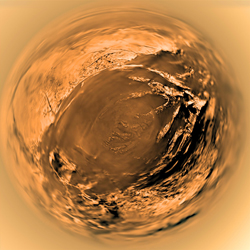Unravelling the composition of Titan’s atmosphere
Evidence from a recent space mission has shown the presence in Titan’s ionosphere (1 000 km above the moon surface) of negatively charged ions. According to scientists, this constitutes an important discovery not only because such molecules had not been predicted, but also because their chemistry is unknown to Earth. In order to understand the processes that lead to the formation of such negatively charged ions, the EU-funded ‘Titan atmospheric composition: Tholins and ionospheric chemistry’ (Tactic) project proposed to develop models of Titan’s ionospheric chemistry. To achieve this, scientists had to perform chemical reactions and measure their rate constants, as well as obtain structural information concerning these negative ionic species. Using mass spectrometry and with the guidance of planetary scientists in Arizona, United States it has been possible to establish kinetic modelling of Titan’s ionosphere. Nitrogen-rich compounds known as tholins – only detected in the outer solar system – have been synthesised by the Tactic scientists, and their molecular and structural composition under negative ionisation conditions is being investigated. Furthermore, by implementing instrumentation for gas mixture production, the Tactic project aimed to recreate the Titan ionosphere by generating negatively charged ions. Collectively, the project findings will not only shed light into the composition of Titan’s ionosphere but will provide important tools for investigating and practicing unprecedented chemistry.



